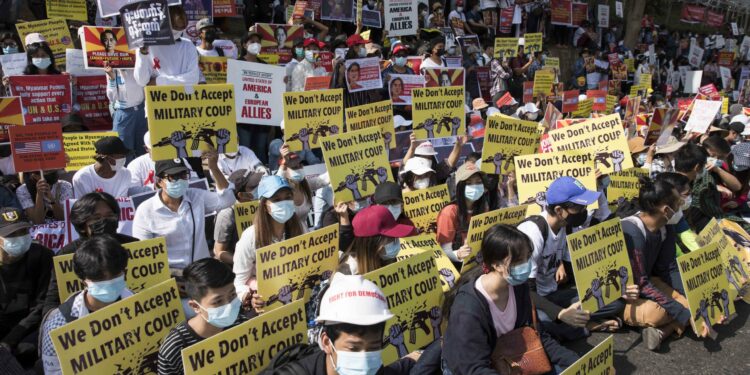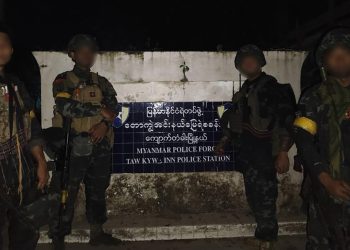A year after the National League for Democracy’s 2015 election victory, as I was wandering about the massive Tatmadaw Museum in Naypyitaw, I could not help but be awed by the scale of the Myanmar military’s gratuitous ode to itself. It sprawls across numerous caverns covering the minutiae of its history. Hiding in its bulk is one room dedicated to the Tatmadaw’s “victories”. What it claims as historic triumphs are battles to control hilltops. While important in terms of individual counterinsurgency campaigns, this presentation masks a reality.
The Tatmadaw does not win wars. It may win some battles but ultimately it draws and seeks ceasefires.
It has been argued in some recent analyses that resistance to junta rule is difficult, nay nearly impossible, because the Tatmadaw has approximately 350,000 troops. Using this number is a gross oversimplification and gives a false impression that the Tatmadaw is in an inherently strong position. This could not be further from the truth, for one reason: The generals managed to provoke a nationwide uprising against the Tatmadaw. There are few comparable examples of such an event since World War II and the period of anti-colonial wars. There is nothing pre-determined about what will happen in Myanmar, certainly not the Tatmadaw’s survival. The coup was a historic shift in the country and a strategic blunder of existential proportions by the generals.
A more apt number to focus on is that Myanmar has a population of over 52 million, nearly all of whom viscerally hate the Tatmadaw. It is this context that confronts the generals. They have reduced their military to essentially being a foreign occupying force desperately trying to suppress nearly the entire Myanmar population. Wherever their soldiers look, they see hostility. Other than its immediate proxies, notably the police and the Union Solidarity and Development Party, there are no significant chunks of the public that are supportive.
The Tatmadaw’s response to this uprising has been predictable. Its tactics of violence, deprivation and cooption have been honed over decades of dictatorship. There is a calculus within the Tatmadaw that it can outlast the public’s anger, the Civil Disobedience Movement (CDM) and a collapsing economy, while isolating whatever revolts emerge. The Tatmadaw believes it has a longer window of perseverance than that of the resistance. The generals will attempt to split the public from the National Unity Government (NUG), the CDM and the country’s most ardent democracy activists. They will endeavor to sow discord between ethnic groups, keep ceasefires with ethnic armed organizations (EAOs) and prevent the defection of proxy militias. They will sell the country cheaply to China.
Whatever successes the Tatmadaw might claim are achieved at high cost in terms of soldiers and resources. That it has not been able to dislodge the Kachin Independence Army (KIA) from strategic gains made in March or decisively quell escalating revolts in Sagaing, Chin and Kayah are signs of weakness. Isolated in its purpose-built capital, hiding in schools in the cities, and having to move in large convoys through the Bamar heartland, the Tatmadaw would be foolish to feel it is presently in a good position. Its troops are harried to quell revolts before they spread, all the while fearing its lacky militias will desert and its ceasefires will collapse when the time is ripe.
Essentially a light infantry force, the Tatmadaw is dispersed across the country in numerous small bases. In the context of a national uprising, this could arguably be a strength if the Tatmadaw was well resourced with good logistics chains and strong mobile units. Poor and under-equipped, it has neither of these. Individual units are increasingly feeling pressure as their resupply is stretched and local populations harass them. Logistics will be further pressed over the rainy season and Tatmadaw rank-and-file will be demoralized as millions openly cheer their battlefield losses on social media.
Having long espoused a “people’s war” doctrine of relying on the population to help repel foreign invasion, it is the Tatmadaw that now faces numerous local self-defense militias. Many of these are the People’s Defense Force (PDF) militias instigated by the NUG, but there are others, such as the Chinland Defense Force, that are local collectives formed to provide security for threatened communities. This trend will escalate.
To accurately assess the prospects of the resistance, it is most pertinent to focus on the military balance in terms of its trajectory. The anti-junta movement should not be judged on its composition at any snapshot in time, but rather on the speed at which it is advancing.
Revolutions never start with a resistance that is well armed, fully staffed and professionally competent. Successful ones have a steep learning curve in terms of effective leadership, developing tactics and making all due haste in acquiring weapons. From this perspective, events are not moving in the junta’s favor. It is facing pressure across the country, including in areas that have not produced sustained revolt in living memory, such as southern Sagaing, but increasingly in other regions all the way down to Ayeyarwady as new PDFs emerge.
The Tatmadaw must increasingly feel like it is a foreign occupying force amongst a hostile population. Its soldiers must fear envelopment across a range of threats—local attack, constricted resupply and suffocating social ostracization. They must be forced to spread themselves even thinner. Increasingly fatigued, they can be harassed and fragmented through countless small attacks.
The Tatmadaw can always win the tactical firefights it chooses to prioritize but will struggle to design a viable strategy against a national uprising. This would be hard for any military facing near universal revolt. Key to the resistance’s success is unity. Battlefield successes against the Tatmadaw will do more to catalyze national solidarity than anything else. Kani, Mindat and Demoso must be precedents for wider collective action, while the whole country owes gratitude to the KIA for its undaunted assaults on State Administration Council forces and to the Karen National Union for providing safe havens.
If the nature of the conflict can be maintained as a national uprising, the military balance favors revolution by sheer force of numbers and willpower. Many analysts have noted the durability of military rule in Myanmar. Such defeatist attitudes serve the status quo of domestic vested interests seeking to wait for others to bear the costs of ousting the Tatmadaw or cynical foreign observers who fail to see how much the Tatmadaw is loathed. Many have also subtly upheld the Tatmadaw’s claim that it is holding the country together, despite years of the military having divided local-level armed groups into competing factions and a complete refusal to meaningfully include leaders from outside its circle in political decision-making, stoking resistance generation after generation.
Lessons are also clearly being learned from the country’s experience during 1988 and afterwards. The NUG sees itself as a revolutionary movement rather than a “government in exile” and has made clear efforts to build a national coalition based on federal democracy. These efforts are still nascent and must be furthered.
Moreover, it is vital that armed resistance is not borne only by ethnic minorities but fundamentally includes the Bamar majority. It is critical that resistance includes the regions and cities. Resistance here greatly threatens the Tatmadaw’s viability. The generals would love to return to the “normalcy” of only fighting EAOs. Nascent “tag teams” between EAOs and PDFs in Chin, Sagaing and Kayah show how potent they could be. The NUG’s ominous warnings of a looming “D-Day” of national action should scare the military more than anything else.
When walking out of the Tatmadaw Museum, one is left with the sense that such a massive complex is intended to hide what is actually an inferiority complex. This is a military desperately trying to show it is central to keeping the country together, ever the benevolent guardian. Any notions of this being accepted by the public are long gone, as the country has risen in revolt. The Tatmadaw is now widely recognized as the barbaric national disgrace it is. Fundamentally this is a crisis that only Myanmar can solve. International action will be distinctly secondary. The Myanmar people should take solace knowing that they have the means and moral right to overthrow a military that has for too long destroyed the country.
Zaw Tuseng fled Myanmar at the age of 17 after participating in the student protest to restore democracy. He spent the following seven years as an exile in a refugee camp on the India-Myanmar border, where he continued to participate in Myanmar’s democracy movement. He holds an executive master of public administration from Columbia University’s School of International and Public Affairs and a BA in political science from Delhi University.
You may also like these stories:
China Has Its Way With a Divided, Inert ASEAN
Myanmar Court Testifies in Three Cases Against Suu Kyi
Myanmar’s Detained Suu Kyi ‘Gave Residences and Almost All Her Money to Charity’

















